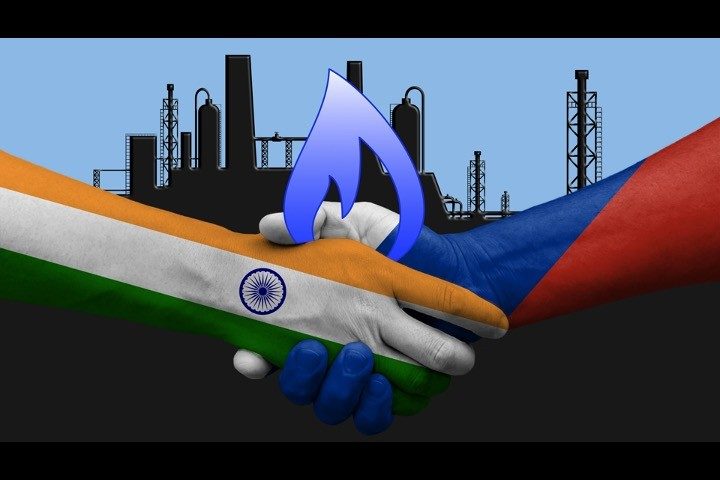
SINGAPORE — India is playing an increasingly vital role in global oil markets, purchasing more and more cheap Russian oil and refining it into fuel for Europe and the United States.
However, New Delhi has faced little public backlash as it is fulfilling the West’s dual aims of restricting Moscow’s energy revenue and eschewing an oil supply shock.
Europe’s increased sanctions on Russia will remove a large volume of diesel from the market and see more consumers, especially in Europe, rely on Asia to fill the supply gap.
Thus, India is most likely going to emerge as an even stronger player on the global oil stage.
“US Treasury officials have two main goals: keep the market well supplied, and deprive Russia of oil revenue,” said Ben Cahill, a senior fellow with the Center for Strategic and International Studies, a Washington think tank. “They are aware that Indian and Chinese refiners can earn bigger margins by buying discounted Russian crude and exporting products at market prices. They’re fine with that.”
India shipped about 89,000 barrels of petrol and diesel daily to New York in January, the most in nearly four years, based on data intelligence company Kpler. Daily low-sulfur diesel flows to Europe were at 172,000 barrels in January, the most since October 2022.
Hence, cheap Russian oil would be even more attractive to India, which depends on imports to meet 85 percent of its crude needs. The nation’s refiners, such as state-run processors that are in charge of meeting domestic demand, escalated exports in 2022 in order to benefit from higher international prices.
“India is a net exporter of refined products and much of this will be going to the West to help ease current tightness,” said Warren Patterson, Singapore-based head of commodities strategy at ING Groep. “It’s pretty clear that a growing share of the feedstock used for this product originates from Russia.”
According to EU guidelines, India is likely conducting transactions within the rules. When Russian crude is processed into fuels in a country outside the bloc, such as India, the refined products can be transported into the EU as they are not regarded as Russian in origin.
Although the Group of Seven (G-7) nations hope to deprive Moscow of as much revenue as possible, they have a stake in ensuring that Russia’s oil and refined products still flow to prevent a global supply crunch, said Serena Huang, lead Asia analyst at Vortexa.
A major aspect of the mechanism to cut revenues from the Kremlin and retain some oil on the market has been a price cap on Russian crude, a move that was spearheaded by the United States. While India has not publicly declared whether the nation does or does not abide by the limit, sanctions have caused oil from the OPEC+ (Organization of the Petroleum Exporting Countries) producer to plummet below the cap of US$60 a barrel.
A U.S. National Security Council spokesman revealed that a price cap had been put in place that countries — including India — could capitalize on to maintain the stability of energy markets while curbing the Kremlin’s revenue.
“India’s willingness to buy more Russian crude at a steeper discount is a feature, not a bug, in the plan of Western nations to impose economic pain on Putin without imposing it on themselves,” said Jason Bordoff, founding director of the Center on Global Energy Policy at Columbia University and a former advisor in the leftist Obama administration.
Executives and officials from nations and companies such as Saudi Arabia, the United Arab Emirates, the United States, and Abu Dhabi National Oil Company were slated to convene for a three-day energy forum organized with India’s Ministry of Petroleum and Natural Gas.
In November last year, India urged Russia to consider a peaceful resolution to the conflict in Ukraine, even as it justified its continued purchase of Russian oil that has been essential to Russian efforts in the crisis. The Indian government has backed the purchases, claiming that they are in its national interest.
At a meeting in Moscow with his Russian counterpart, India’s Foreign Minister S. Jaishankar said that the global economy was “simply too interdependent” for a conflict not to have “major consequences” in other parts of the world.
“This is not an era of war,” Jaishankar said, echoing the words of Indian Prime Minister Narendra Modi to Russian President Vladimir Putin in September. “India, therefore, strongly advocates a return to dialogue and diplomacy.”
Nonetheless, India has gradually ramped up its imports of Russian oil since the crisis began in February last year, notwithstanding Western efforts to limit the Kremlin’s ability to finance its operations in Ukraine. Jaishankar said that India’s approach would not change despite pressure from the U.S. and its allies for a price cap on Russian oil. “It is our fundamental obligation to ensure that the Indian consumer has the best possible access on the most advantageous terms to international markets,” he said. “So, if it works to my advantage, I would like to keep that going.”
By maintaining business ties with Russia, India has arguably become a key behind-the-scenes player in diplomatic efforts throughout the crisis. For instance, in July, it facilitated a deal with Russia to release millions of pounds of highly demanded Ukrainian grain.
While Indian officials have stated their desire that New Delhi could eventually function as mediator should Russia and Ukraine reboot peace negotiations, Jaishankar did not clarify what that might entail. “India will be as helpful as we can be,” he said. “We are clearly on the side of peace, respect for international law and support for the U.N. charter.”
Moscow reportedly sent India a list of over 500 products for potential delivery, including parts for cars, aircraft, and trains, according to sources familiar with the matter, as sanctions limit Russia’s ability to keep key industries in operation.
The list, a version of which was seen by Reuters in New Delhi last November, was stated to be temporary. Thus, it was unclear as to the number or quantities of items that would ultimately be sent to Russia. Notably, an Indian government source posited that the request was unusual in its scope.
India is interested in enhancing trade in this way, said the source, as it attempts to reduce a rising trade deficit with Russia. Some companies have voiced worries, however, that India’s actions could possibly run counter to existing Western sanctions.



